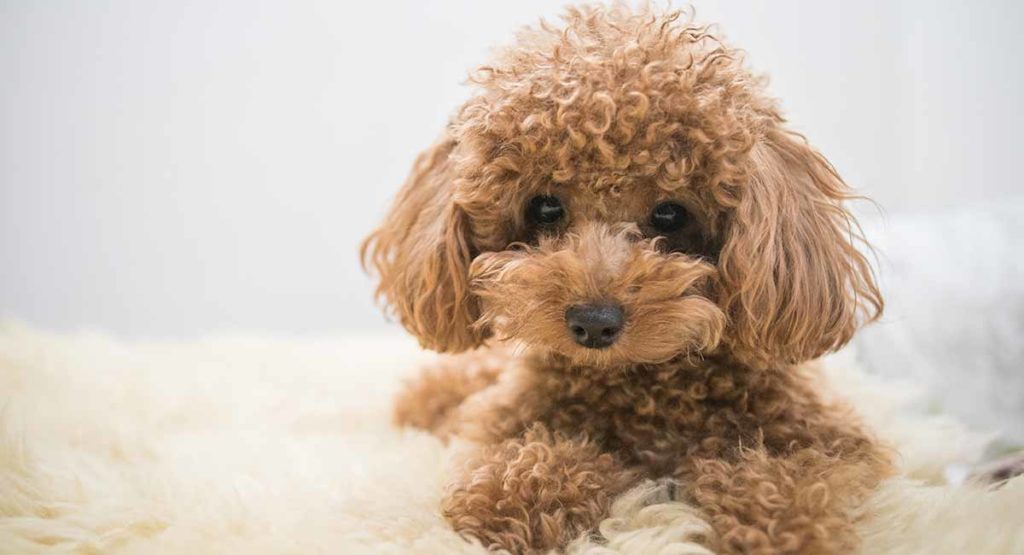
The Toy Poodle dog breed is the smallest version of the Poodle dog. These curious puppies are intelligent, active, social, friendly and might just be the perfect apartment pet, lapdog or sporting companion. They have curly fur in lots of colors, with droopy ears and dark eyes. Although not a guarding breed, they will bark like a watch dog when visitors arrive. Toy Poodles need regular exercise, training and grooming to stay happy and healthy.
Contents
- How big do Toy Poodles get?
- Toy Poodle lifespan
- How much is a Toy Poodle?
- Finding Toy Poodle breeders
PROS: Intelligent, long-lived and easy to train. CONS: High maintenance, vulnerable to injury
What Were Poodles Bred For?
The first thing you need to know about the Toy Poodle breed is… it isn’t a breed!
In the USA, the UK and Australia, the debonair Poodle comes in three sizes: Standard, Miniature and Toy. In the UK these are separate breeds each with their own register. But in the USA, the different Poodle sizes are all categories of the same breed – the Poodle – rather than distinct breeds in their own right. To find the history of the Toy sized poodle, we need to look at the breed as a whole.
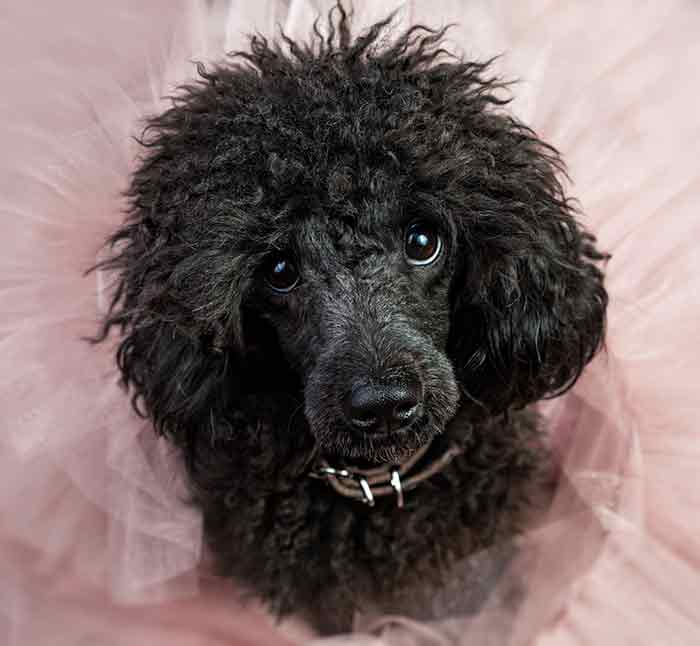
Toy Poodle Origins
Poodles are often thought of as a quintessentially French dog, but they actually originate from Germany. There they were originally bred as retrievers for fetching ducks and other waterfowl from the water.
Poodles are derived from Barbets – water dogs which are still around today. Barbets are pretty big, so unsurprisingly the Standard Poodle was the first size of Poodle to be recognized in it’s own right. A modern American Toy sized Poodle is actually an historic German dog in a little Poodle body!
Scaling down
Miniature and Toy Poodles were created by gradually scaling down the big Poodle dog. This was first done for specific hunting tasks. But changed to breed them for companionship. These very small Poodles aren’t a recent development, in fact they’re widely documented as far back as the 18th Century!
Fun Fact!
Poodles are loved by everyone throughout history. In fact they’ve even been a popular pet for celebrities and royalty! Elvis was one of these well known Poodle lovers. He adored Poodles so much he often gave them as gifts to his loved ones. He gave one called Little Bit to an early girlfriend, gave one named Duke to his mother, and gave his wife Priscilla Presley a Toy Poodle called Honey!
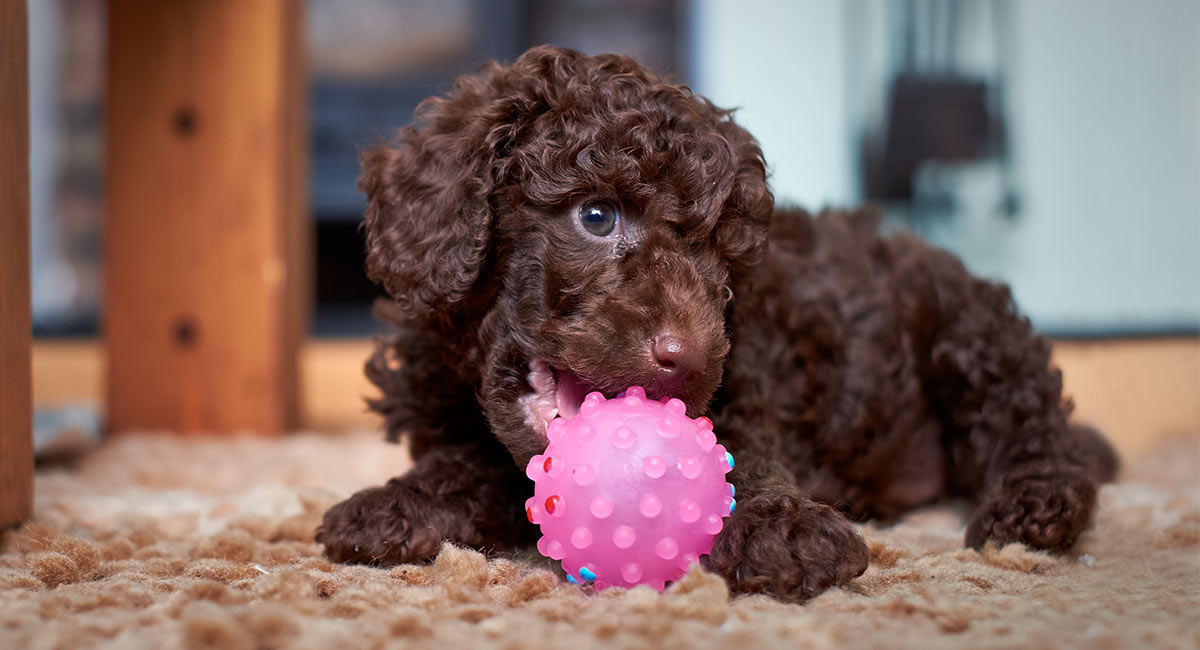
Toy Poodle Size
Poodles in the toy category grow to a maximum of 10 inches at the shoulder. After that a dog would be categorized as a Miniature or Standard Poodle depending on how much bigger they grew. Miniature Poodles can measure up to 15 inches. That puts our curly toy breed on the same scale as other toy dog favorites, Pugs and Shih Tzus.
In the show ring, where two of these tiny toy poodles are equal in all other respects, the smaller dog will take the rosette. So what is the magic tipping point when a Miniature Poodle becomes a Toy? It’s that 10 inch height!
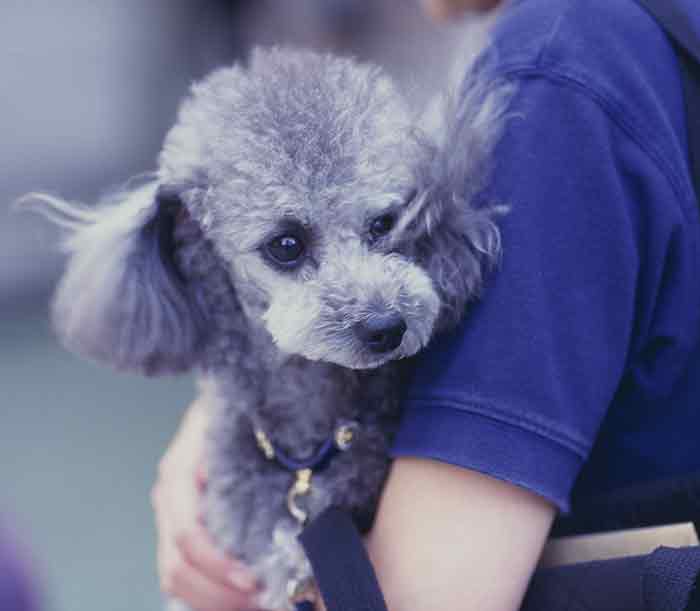
Toy Poodle Weight
Generally, a healthy Toy Poodle fully grown will weigh between 4 and 6 pounds. This, again, is less than a Miniature Poodle, who should weigh in between 10 and 15 pounds.
The toy poodle adult is a very small dog. And their puppies are very tiny indeed. This tiny size makes this small Poodle dog breed vulnerable to injury at any time but especially when they are new puppies, and this is something to consider when deciding between a puppy and a rescue dog.
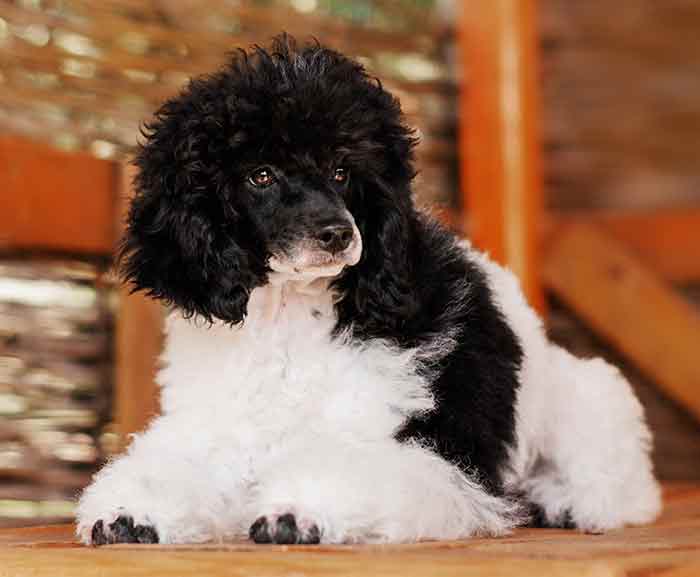
When Do They Stop Growing?
Like many other smaller dogs, this small poodle breed reaches maturity sooner than their larger cousins, and your Toy Poodle dog will be fully grown by their first birthday. So it’s important to make the most of those few months with your cute fluffy puppy, as they will soon be all grown up!
How long do Toy Poodles live?
This is a breed with a relatively good life expectancy. A small sample of owners in the UK who were willing to complete a survey for the Kennel Club including details of how their pets had died (20 dogs in total), found that the average lifespan of those Poodles in the toy group had been 14 years and eight months. And it is not that unusual to hear of a 17 or 18 year old Toy Poodle.
Fourteen is a respectable age for any dog. It also reflects the general rule that small dogs tend to live longer than large dogs (the average age for Standard Poodles in the same survey was 12 years). And pleasingly, the leading cause of death when the time came was simple old age.
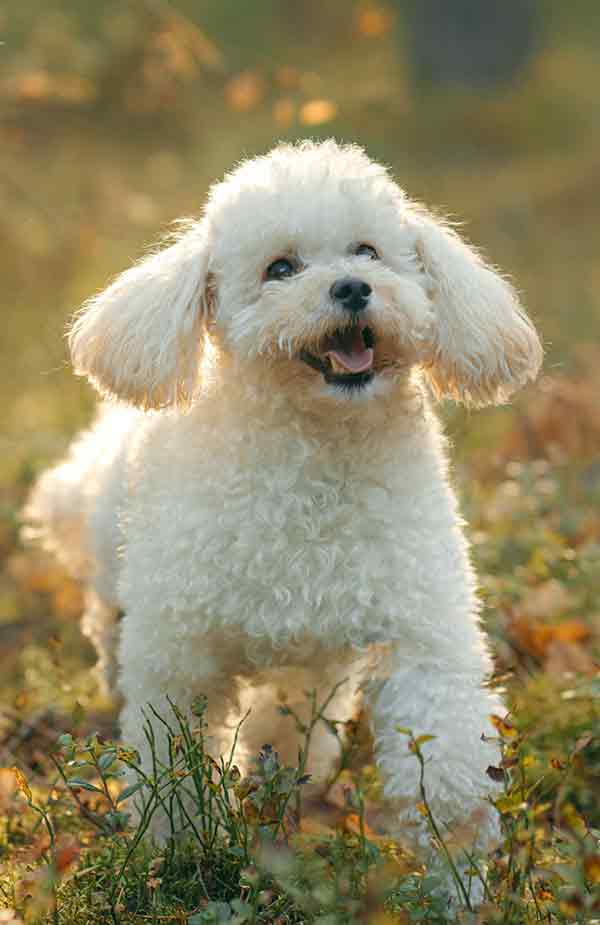
A Distinctive Appearance
Generally your little Poodle should appear squarely built and well proportioned. They have dark, oval eyes and their ears hang close to their heads. Poodles have long, straight muzzles, and of course a very distinctive coat. Let’s take a look at their coat in more detail.
Toy Poodle Tail
In the USA the toy poodle tail is usually docked, which means that the tip of the tail has been cut off. This is a procedure that is carried out when puppies are just 2 or 3 days old.
Tail docking is illegal in much of Europe and in England and Wales is only permitted for working dogs such as terriers, retrievers, and spaniels. Generally toy dogs and companion dogs are no longer docked there. Toy Poodle tail length after docking is about half to two thirds the original length of the natural tail
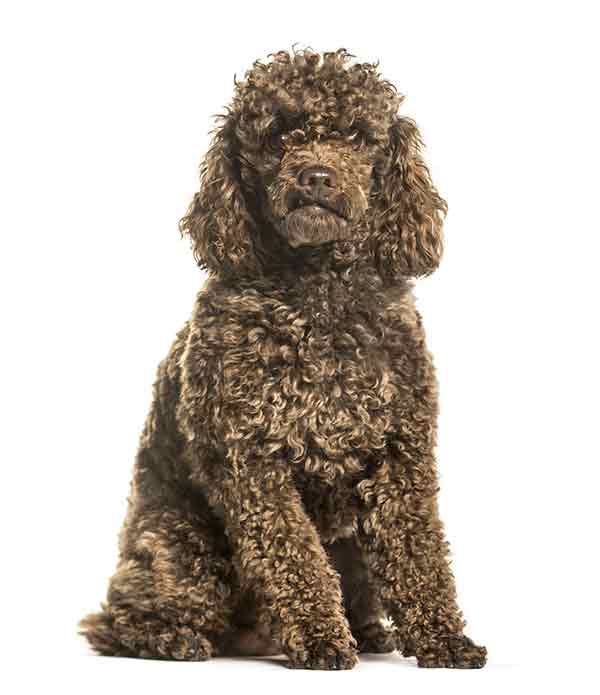
Does A Toy Poodle Shed Hair?
Poodle coats don’t shed, in the sense of leaving hair all over your carpets and furniture. But their coats do keep growing throughout a dog’s lifetime. Left to their own devices, they will eventually “cord” – the canine equivalent of dreadlocks. That means some form of grooming is a must.
Coat Care
Your dog’s coat will need brushing every day to keep on top of tangles and sweep away dirt and debris before it can accumulate. It will also need trimming every six to eight weeks. For most Poodle parents, this is as straightforward as an all-over haircut, known as a pet clip or a puppy clip.
Grooming A Toy Poodle
If you’re planning to enter your pride and joy into dog shows (or even if you just fancy the aesthetic of pom-poms at the ankles), then you’ll need to find a dog groomer with specific experience of looking after Poodles. They will initiate you into the fascinating and (dare I say it?) bewildering world of continental clips, English saddle clips and bikini clips.
They’ll be able to advise you on the different types of ‘cut’. The Toy Poodle puppy cut for example, is a short ‘all-over’ cut that gives your puppy and easy to manage coat of 1-2 inches in length. A teddy bear Toy Poodle is one that has been given a teddy bear Poodle cut which leaves more hair on the face and paws, giving a puppyish look.
Groomers can also help you identify which you’re allowed to choose from according to your chosen breed registry, and then choose which would be best for your dog. And if all this makes you think the that a corded coat might be the way to go, bear in mind they are the highest maintenance coat of all to keep clean.
But, before you despair, remind yourself that the time spent grooming your Poodle would otherwise be spent hoovering up dog hairs and lint-rolling the furniture if you’d chosen a different breed of dog that sheds!
Are They Hypoallergenic?
When it comes to fur, color isn’t the only factor you may be considering. One defining feature that all poodles have in common is those glorious curls! And an important feature of tight curls in any dog is that when the dog sheds, as all dogs do, the shed hair remains trapped in the curls rather than ending up on your clothes and furniture.
Because shedding is reduced in Poodles some people with allergies are able to tolerate being around them when they are not able to tolerate dogs with coats that shed freely.
However, it’s important to remember that no dog is truly hypoallergenic and if you suffer from allergies it’s important you spend some time with these dogs to make sure that their fur does not trigger respiratory problems.
Coat Colors
There are a staggering ten Poodle colors. Some of them incredibly vibrant – a full grown red poodle, for example is a very striking sight! Other shades are more muted and subtle. There really is a color to suit every taste. You can also get tan Poodles, a pale version of the brown Poodle puppy.
- apricot
- black
- blue
- brown
- cream
- gray
- red
- silver
- silver beige
- and white!
In addition, they list an astonishing eighteen acceptable two-tone coat combinations in their breed standard. Including the toy parti poodle, with their striking black and white patches. And if that’s not enough already, whilst looking for a Toy Poodle puppy you’ll probably encounter even more colors, which aren’t recognized by the breed registries, but look just as sharp. So no matter what color Poodle you picture having, with a little patience and perseverance you’ve got a good chance of finding them.
What you won’t find is a lot of difference between the colors. The silver Poodle temperament is likely to be much the same as the black Poodle’s personality!
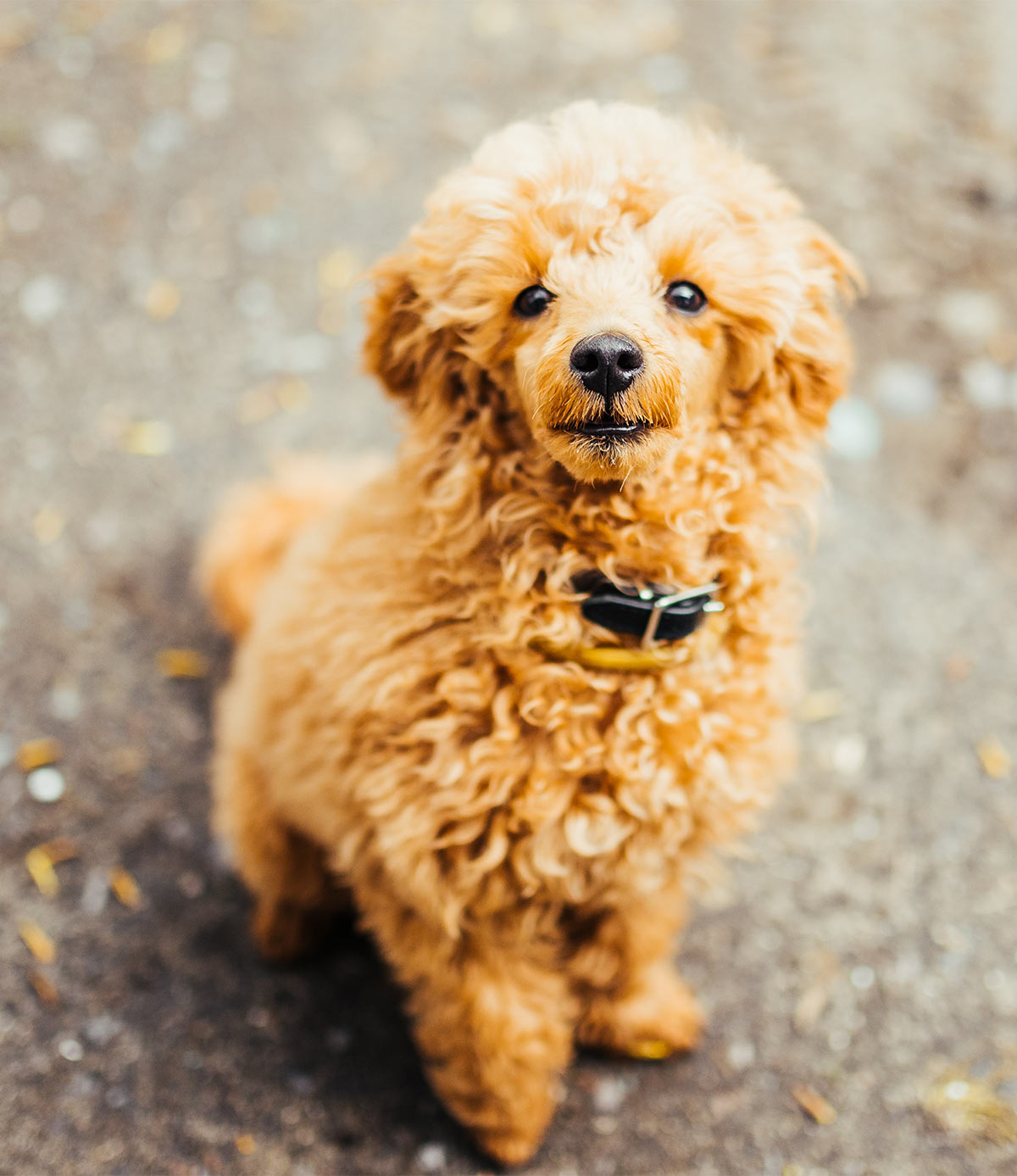
Toy Poodle Temperament
These tiny dog really do bear the brunt of two unfair stereotypes. That Poodles are fussy and high maintenance, and that small dogs are, well, even more fussy and high maintenance. In fact, a properly-raised small Poodle should be free from behavioral problems and have a similar disposition to a Standard Poodle. And the Standard Poodle was bred to work happily and productively alongside humans.
Toy Poodles personality should be active, proud and very smart, and gay-spirited and good-tempered. If they’ve been given a good amount of exercise, they should also be happy to be a bit of a lap dog at home. A Toy sized Poodle should be like a best friend who thinks all your ideas are excellent and wants to join in without fuss.
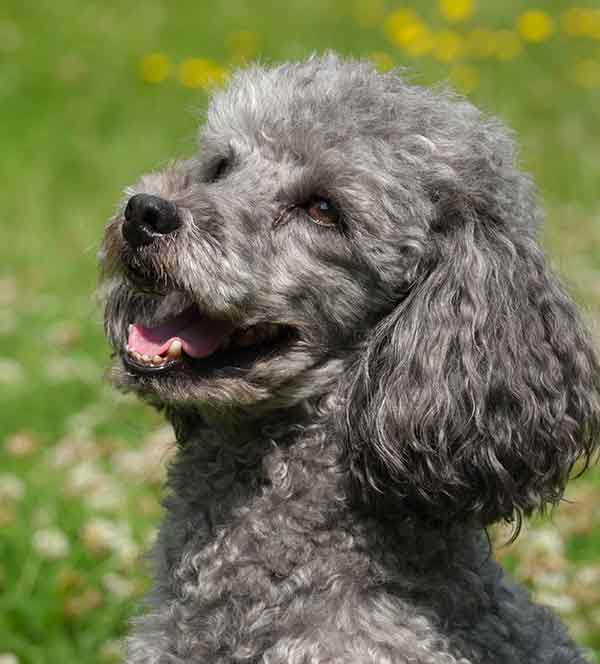
Separation Anxiety
This small Poodle breed are popular companion dogs because they reciprocate our love of company. But the flip side of this is that they don’t take kindly to being left out.
They are likely to become stressed and bored if they’re left alone in an empty house for long periods. If you work full time, you’ll need to factor in the cost of a pet sitter or regular dog walker.
Training and Exercising your Toy Poodle
Many people think small dogs don’t have many requirements when it comes to training and exercise. However, they’re mistaken! Even smaller dogs need consistent training and regular exercise!
Historically Standard and even Miniature Poodles were prized for their quick intelligence and trainability as hunting companions. The smallest Poodles don’t share their older cousins’ working roots to the same extent, but they do share their intelligence. With patience and practice, channeling those smarts into a well-trained and well-behaved dog should be an achievable and rewarding way to bond with your new dog.
Don’t let their small size fool you – these dogs are smart, energetic, and love to join in with days out. You’ll need to provide plenty of opportunities for exercise. An hour a day is the absolute minimum. You’ll also need to keep them engaged with plenty of training and fun games at home.
Toy Poodle Puppy Socialization
Like all toy dogs, your little Poodle mustn’t be allowed to skip socializing or obedience training just because they’re small enough to scoop out of trouble. Lots of socialization as a puppy will be vital to instill them with the confidence they need around people as adults.
If your tiny friend will be visiting or visited by children, arranging a fun and rewarding introduction while they’re still a puppy will set them up for a happy relationship in the future. Even if you don’t have many children in your life, it’s still a good idea to get your puppy to be comfortable around kids, under supervision of course. The last thing you want is a little dog that is scared of children and snappy as a consequence.
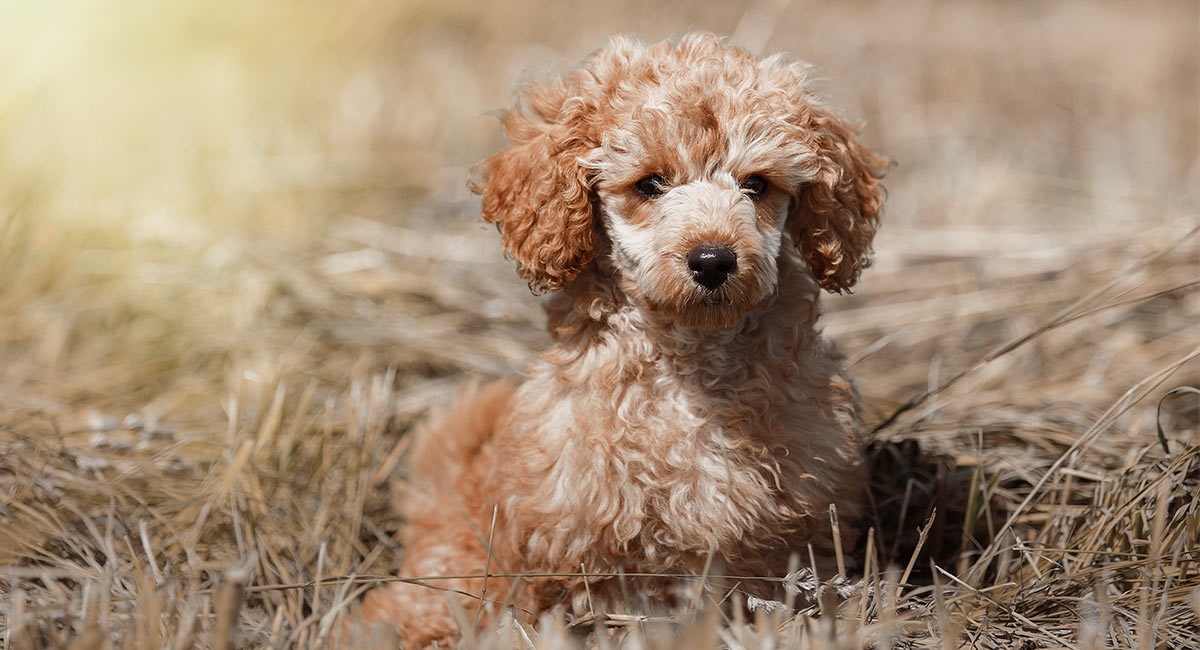
Do They Make Good Family Pets?
Toy Poodles are intelligent breeds that suit families who can spend a lot of time with them. They don’t do well being left alone. And really benefit from time spend bonding whilst training or playing. They suit families who have the time to exercise them regularly. They don’t have too many severe health problems, which means they’re a relatively good choice for most families!
Are Toy Poodles Good with Children?
Standard and Miniature Poodles are a popular breed choice for families with children because they’re typically confident and relaxed around humans, and relatively easy to train. Among Poodle owners, Toy Poodles are generally reported to be more nervous than their bigger cousins, which means kids will have to be older before they can be left unsupervised with a Toy Poodle.
You’ll also need to consider how likely it is that your tiny pup could accidentally get hurt. Most children will easily outweigh a Toy Poodle by their second birthday, but toddlers (through not fault of their own) are still clumsy, and if they fall onto your dog, the dog is likely to end up injured.
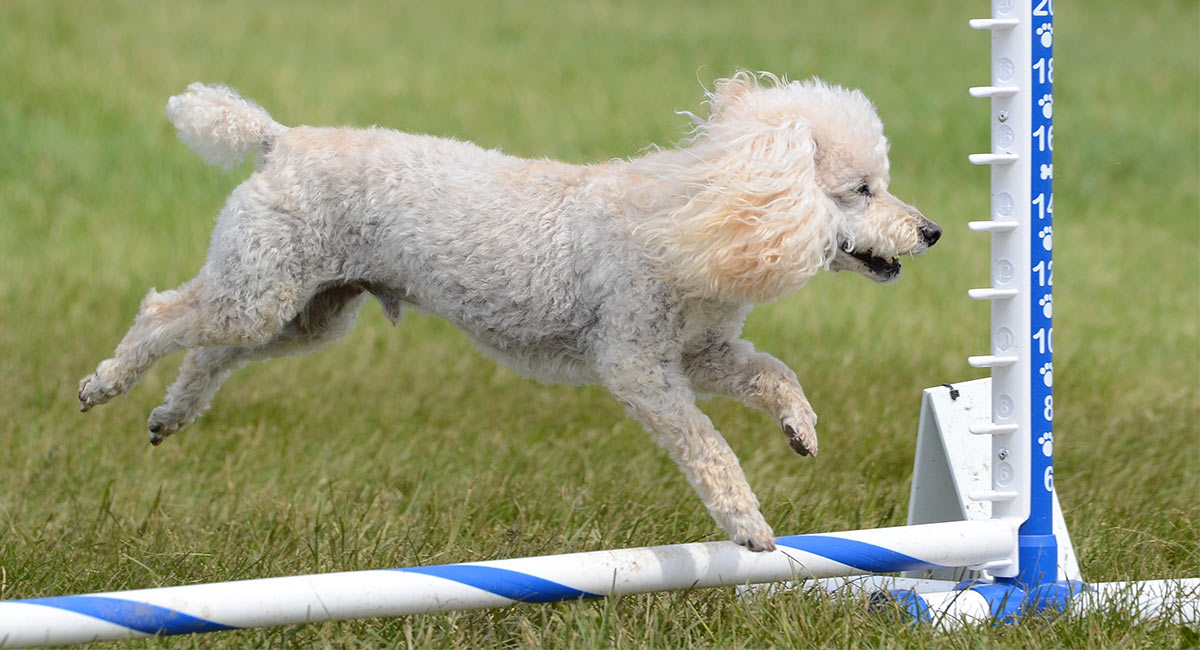
Toy Poodle Health and Care
There are many factors that come under the puppy health and care bracket. Especially when you think of caring for that unique fur!
Through genetic good fortune and the wisdom and prudence of Toy Poodle breeders, there are lots of healthy puppies being born. However, like any breed, there are some health problems which they tend to be vulnerable to:
- Progressive retinal atrophy
- Cataracts
- Patella Luxation
- von Willebrand’s disease
- Thyroid problems
As with any breed, you should check your Poodles ears for excess wax regularly. Also make sure to keep his nails trimmed. You’ll want to find a high quality dog food to ensure he grows into a happy and healthy adult!
Rescuing a Toy Poodle
If you’re eager to welcome a tiny Poodle into your home, you can also consider looking for Toy Poodles for adoption. Although you might not be able to find a puppy, choosing to go to a rescue is a great way to give a dog a second chance.
Toy Poodles end up in shelters or foster homes for all kind of reasons. Some may have been given up for behavioral issues which an experienced dog owner is best-placed to rectify. But others were much loved pets who have fallen on hard times, for example because their owner has died or become too ill to look after them. Could you be the right person to give them a second shot at a happy home?
Finding Breeders
A responsible breeder will be happy to answer all these questions when you approach them, and arrange for you to meet both parents before you take home your puppy.
Your prospective puppy should be with mum when you go to meet them, and it should be obvious she is a beloved family pet. She should know her name, and their should be obvious affection between her and the breeder (she has recently given birth after all!).
Poodles of all sizes are commonly mistaken for being hypoallergenic because they don’t shed. This means they’re a favorite of puppy farms. It’s important to avoid puppy farms and pet stores, as these puppies and the dogs they’re bred from are not treated well. Always take every precaution possible to make sure you buy your puppy from a responsible breeder.
Worried that a pedigree Toy Poodle breeder is the wrong place to find a family pet? Don’t be! In reality only one or two puppies from a litter will be show standard, but the rest will still be happy, healthy, well-treated “pet puppies”.
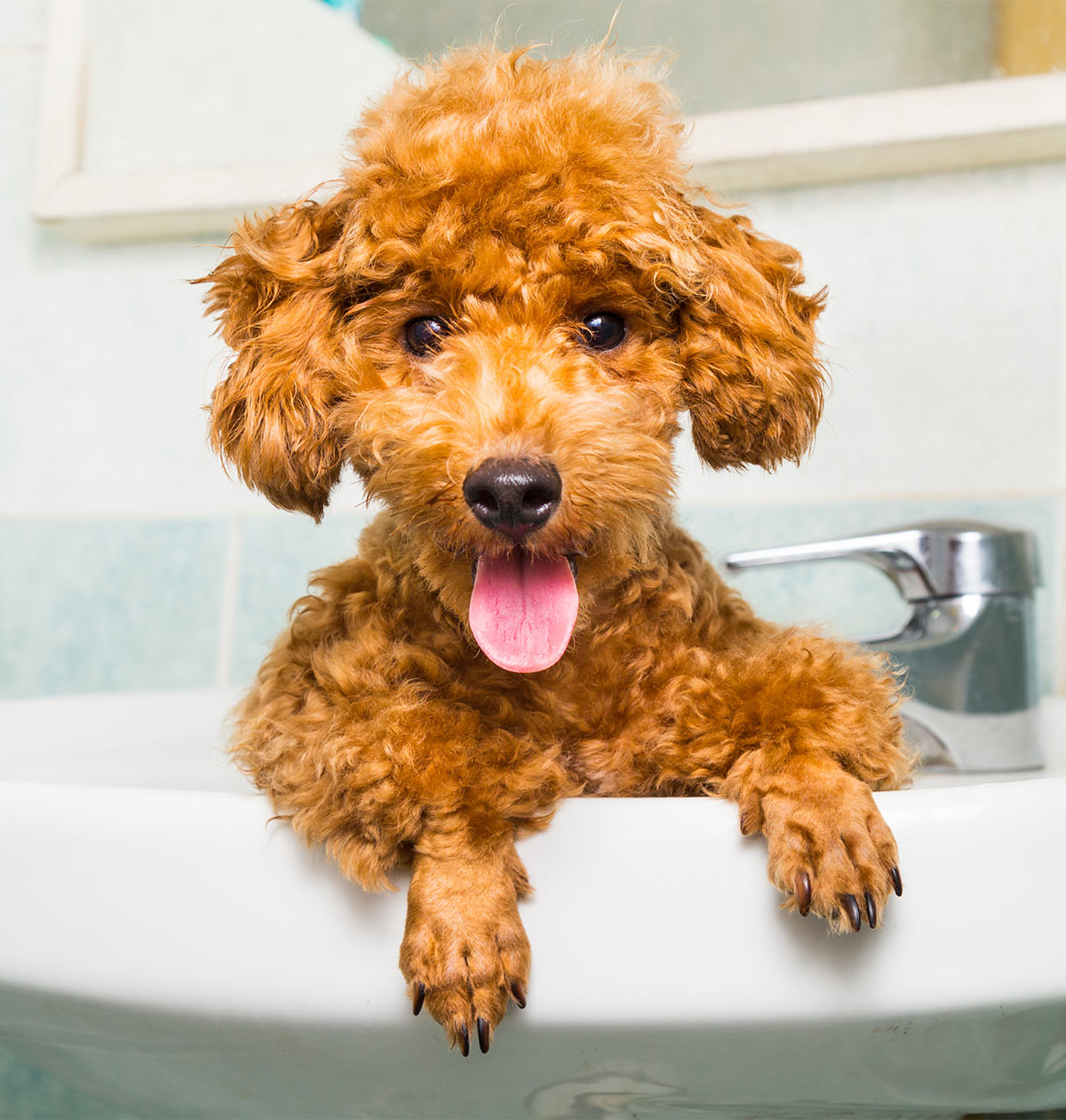
Toy Poodle Price
Bringing a litter of healthy puppies into the world is not a cheap business. A Poodle puppy can cost anything from several hundred dollars to well over a thousand dollars.
Part of the cost might reflect that they are an unusual or sought-after color, or their parents have performed well in the show ring. But the steep Toy Poodle cost is far from profiteering.
Their parents needed to be health tested before the mating took place, the mum needed veterinary care throughout her pregnancy, the puppies needed feeding, worming and flea-treating… it all adds up.
When considering how much a toy Poodle is going to cost you, it’s also worth remember that the price you pay for your puppy is only a very small part of the overall lifetime cost of raising and caring for your dog. Your biggest outgoing by far, is likely to be health insurance.
Cheaper Toy Poodles
If a Poodle puppy price sounds too good to be true, their welfare is likely to have been compromised at some point to make that possible. So it’s important not to buy a pet shop toy poodle, or a puppy from a puppy mill which is how pet stores are supplied with puppies. Also bear in mind that even though a puppy seems expensive, the upfront cost is just a tiny fraction of how much you’ll have to pay to keep them over their lifetime.
Miniature Toy Poodles
Before we go, we should probably just mention the mini toy poodle, sometimes know as the teacup toy poodle.
When small dogs are so cute, it can be a small step to assume that even smaller is better. However, extreme miniaturization often comes with serious health issues.
So do take care when aiming for mini puppies. Teacup Poodle breeders are likely to be compromising the welfare of their dogs in order to achieve those smaller sizes. You can read more on this topic here: Teacup Toy Poodles but if you are undecided between mini vs Toy Poodle, it’s best to go for the toy puppy, every time.

Lucian K Bochichio says
In the last 37 yrs my wife and I have rescued 5 toy poodles from all over the east coast. We are looking for another one 7 or 8 or so.
Mildred says
Where do you find them?Soo am I but I don’t knowwhere to look for one
Marie Smith says
I have a brown Toy Poodle his name is Asher, been to puppy school do trick training and agility he is 3 years old and very very cute, love him toooo pieces.
Al says
We’re fid you gat your toy poodles
Dog lover says
I have an apricot toy poodle
Valaria says
I also have an apricot toy poodle.
Zahara says
This is beautiful I love all the dogs.
Betty Barclay says
I am seriously looking for a tiny toy poodle. I would be very interested in a white female of show quality. About 8 weeks old. I need a price and registration papers. Purchased for a loving pet to spoil rotten. Just want a lifelong friend!
Chloe says
I was thinking about getting a Holland lop bunny but this just-CUTENESS OVERLOAD
Edd Edward says
They are the cutest. I’d love one but we’ve got two dogs already. Best leave it and close this site 😀
Mark says
Thanks for this amazing blog about pet.
Amy Jett says
I am looking for a toy red or brown female preferably. Does anyone know of a well reputable breeder on East Coast of USA? Am willing to drive (certain amount of hours) to get her!! Please let me know. Thank You, Amy
Lindsay says
Yes. I got a beautiful Apricot female from Parti poodles in North Florida . She is two years old. Ask for Abby.
Kim Russell says
I adopted George (black toy poodle) almost 4 yrs ago as a rescue dog. He’s estimated to be almost 12 now! He rescued me too! 🙂
Jason peele says
Looking a toy poodle for my mother she just lost her bundle of joy a few months ago at first she said she didn’t think she would be able to train another one but after a short while I saw her looking for a poodle again I live in the Richmond Virginia area please Notify me if you have a poodle that needs a great home
Gayle Peters-Coates says
I am in PA, and I am looking for a small toy poodle puppy. I have had poodles all my life, and currently have just one, a 12-year-old little girl. She’s very frequently socialized with other dogs, and I think she’d be every happy with a little brother or sister.
I’m a retired RN with lots of time to share, and I’m very conscientious about health (people and animals!).
MARCIA J ALLAR says
Looking for a brown toy poodle. My beloved Sophie passed away after 14 years. Live in Newton Massachusetts. Anybody know any dogs out there?
Ashley Torres says
I bought a toy poodle recently from my mother’s friend. he’s a sweet little creature almost 3 months old and good with my 12 year old sister and 8 year old brother. he is a playful puppy who needs lot’s of attention and is also a bit sassy which is why i named him prince lol. i think toy poodle’s are great small dogs for the family and also a bit good with kids, my aunt has a male and female and she breeds them for a living, she recently had a baby who is now 6 months and her poodles get jealous the baby gets more attention than them, she says its easy to care for them and has no trouble grooming her two poodles
Ronna Anderson says
My son bought me a toy poodle that’s considered overly large, and at 6 months his height is more than my miniature poodle. Does this have any bearing on his health?
David says
I live in the New Orleans la. Area. I am interested in in a toy poodle in the 7-10 lb range preferred female.Contact me if u have any available.
Sabine says
Hi hope someone can help me or give me advies if we Made the right decision.
Last weekend we went to a petshop to get a Toy poodle. Well, we ended up getting siblings (sisters). Emotional I am all for it but rational I am still doubting if I made the right decision. My kids and husband are very eager two have them both as they are so strongly attached to one another. Tearing them up would be so sad for them is what they say. But now my rational thought are taking over. Have we made a huge mistake? Are we taking to big of a step? Training two pups instead of one? Having double costs? I feel we have been too impulsive on one hand and then again on the other hand I feel we are doing a good thing. I have been reading on websites to NOT take two pups/siblings at the same time. So my rational feelings are confirmed. Can anyone tell me advise that what we are doing is good or not such a good idea? I looooooove dogs and I was instantly in love but I’m afraid I will cost me all my time…. please help me sort this out. Otherwise I need to call the pet shop tomorrow (I live in Singapore where you get most pets in a shop). Thanks for reading a helping. Sabine
ANGEL PITT says
IF YOU HAVE TWO CHILDREN, ??? IT MAY WORK OUT, AS LONG AS THEY REALISE THEY NEED ATTENTION – EVERY DAY!!!!
IT IS COSTLY GROOMING YOUR PUPS AND HEALTH WISE IS IT ALSO EXPENSIVE.
GOOD LUCK – WHAT EVER YOUR DECISION.
Sue says
Dear Sabrine
You have done an amazing thing in having two puppies. They are company for each other when you are not around. They are entertaining in that they will chase each other when you are outdoors or indoors. Think of them as two more children who do not need dressing and changing every day, but a lot more fun! Cuddling your poodles will make you so happy and relaxed. Brush them gently every week, play with them, listen to what they are telling you and take them for cool walks. They cost a LOT less than children and you can learn how to groom them at home. I LOVE all my poodles and they are like having little friends all around the house.
Julie says
Reputable breeders never sell two dogs at a time as pets. Why? It is too difficult to train two of them at the same time. They bond with each other instead of the owners and are less likely to listen. So you want to have the dog bond to you so it is anxious to please you. Also, the expense of two dogs is quite high. I have two dogs and the vet bills for just routine care is $2000 a year. Plus there is monthly grooming of $125. And I cook their food because one is a senior. So that is another $75 a month.
Darlene says
I don’t totally agree with what you said. I have two toy poodles from the same litter and there bond is to me than to each other its not that they don’t love each other they run and play , hunt and a little comparison but when there done its all me. And I love them both
Kate says
No, you haven’t made a mistake at all! I have an 8 year old Havanese and recently got a toy poodle puppy. I can’t imagine the poodle by herself. She loves her big brother and she spends a lot of time following him around and getting him to play with her. Toy poodles are just amazing, smart, funny lovable dogs. I would get another one if I could!
Johnnie says
We have two toy poodle sisters that are 12 years old now. Never a problem with them. We had them toilet trained in Les than two weeks. We wouldn’t take any amount of money for them. They are definitely the greatest purchase we ever made. We now have 10 grand children but I would have to say my poodle are the most joy in our lives!! When going out of town, they go with us, by car!
Brenda says
I just adopted a toy poodle 3 months ago she is the joy of our life she is 2 years old they had so many toy poodles at pound I wish we could have adopted more
Keron says
Want to rescue toy poodle. I live in Nashville Tn. Will travel
Sata says
I have a toy poodle (black and white parti) and a miniature poodle (apricot). I love them both. They are great dogs and are very smart. (Sometimes, too smart). Both of them really like to please us and are happy, loving lap dogs!
Pat says
I couldn’t live without my toy poodles they are our babies they are verry spoilt but never distructive we give them plenty of toys to play with and yes they do miss us when we go out but they love us when we come home . We do breed them and only go to the best of homes with certiticate of fitness and large puppy pak with every thing they need and DNA .Our toys are small and never had flees or worms. View parents .They are birthed in our home where they live and are verry happy beautifull dogs ?
Bernadette Lepkowski says
I have a few questions. We are about to purchase a toy poodle within days. I’m nervous about not seeing her first. She will be coming via airplane ride. Is it possible that a cheap price is probably too good to be true? Also, is there a way to check to see if the breeders have the puppies best interest to heart. I don’t want to buy one from a puppy mill. Thanks I’ll be waiting patiently. For your answers. Thank you Bernadette
Bridget says
I have 2 Maltipoos & met them as well as both parents & breeder before I got them. I would advise against getting a dog without meeting the pup, the parents, the breeder & touring the facility first to avoid any puppy mill situations. ALL reputable breeders will allow this. If they say no to any of it BEWARE
Carroll Spanel says
as always if in doubt wait. ask questions. get pictures of pup and both parents. if the breeder won’t send pictures or answer your questions, back off. ask around. there are plenty of people that will point you to a good and reputable breeder. I got my little party girl from a great breeder that I found through my best friend who has 1 teacup poodle and 3 toys. I am so happy with her. I know that this reply is coming to you rather late, so I do hope you found the right match for you.
Annette says
I have been looking for a toy female can any suggest a good breeder I can trust. I would like a lite Brown,Beige or red I would feel better if I can pictures and prefer that the puppy be delivered by ground transport,.Thank you all for your help
Juan says
I would like to know how this worked out for you. Thanks for your time.
Mildred says
I am looking for a white toy male poodle I have a white toy female. She is the love of my life. She is 2 years old. I want to breed her. At least once.
Leila Torres says
Please let me know of a good toy poodle in Miami fl,i have had three of them and they are the best!!!thank you very much!
Carol says
My husband and I bought an 8 week old apricot toy poodle puppy. I instantly fell in love with him and he’s now going on 14 years of age. He’s healthy and energetic and eats twice a day. We had him neutered as a puppy and he’s only been to a vet since for his needle updates. He’s our heart and soul. He doesn’t bark when people arrive or leave being very quiet. His eyesight is worsening now and his hearing but is expected since he’ll be 14 in Nov. He’s very intelligent and easy to train. He loves our family and friends. Toy poodle is definitely our pick of small dogs due to their trainability and love of the family. They love other dogs and cats as well. Amazing dogs! He weighs approx 10 lbs. His Vet is amazed with his health. He is on adult canned food and we also feed him cooked veggies twice daily. I bathe, clip and clean his ears and do his nails myself. Ollie is our pride and joy! Everyone who has met him falls in love with him. He has such a kind and loving personality. I do keep smaller kids away from him now as to protect him but he loves them still. I cannot imagine any other dog comparing with a toy poodle. I will replace him with another toy poodle when it’s time to part with him.
MARCIA J ALLAR says
What type of canned food do you feed him and what veggies do you make?
Betty Barclay says
I do not feed my Toy Poodle can food period, I feed my dog dry Eukanuba for mature dogs. He is never sick and the only time he sees the Vet is for shots every year. He never barks unless someone knocks on one door or another. Easy paper trained in 2 weeks. Smart and a great dog. We got him when he was 8 weeks old and he is 11 years old. 12 in April.
Glory Vitale says
My husband and I absolutely love poodles. We currently have a red head since she was 8 weeks old. She just under went her 2nd ruptured ACL and had an issue with her knee. all is healing well. We have our pets regularly checked at the vets . this is apparently just her issue with her legs. I believe now that she was a puppy mill puppy but wouldn’t trade her for anything. She is loveable but on her time , not yours. lol. very obsessed with HER property especially when it comes to my husband or our other poodle which she took the motherly instinct to. we weren’t quite sure if she would love him or chew him up when we brought him home. ( she truly loves the little guy) Our little boy on the other hand has the absolute most loveable disposition Ive ever seen in a dog. he is now 2 and he truly makes you love him because hes just hilarious. So, here you have my story on how poodles are the same but quite unique. both raised as spoiled fur babies yet
D. Dawson says
Dear Gloria V.
I’ve in search for a red head that stays red. Are you aware of your dog’s breeder by chance and is your poodle still red…?